These books are located in case 8 rows 4 and 5 except where noted.
Anonymous. Danck, Lob, und Jubel. Stuttgart, 1730. Celebration of the 200th anniversary of the Augsburg Confession at the new Rathaus in the village of Schorndorff near Stuttgart. Contains a play on the Reformation, a debate between Luther and Tetzel, and two sermons by Johann Gottlob Carpzov. Gift from Paul Bretscher.
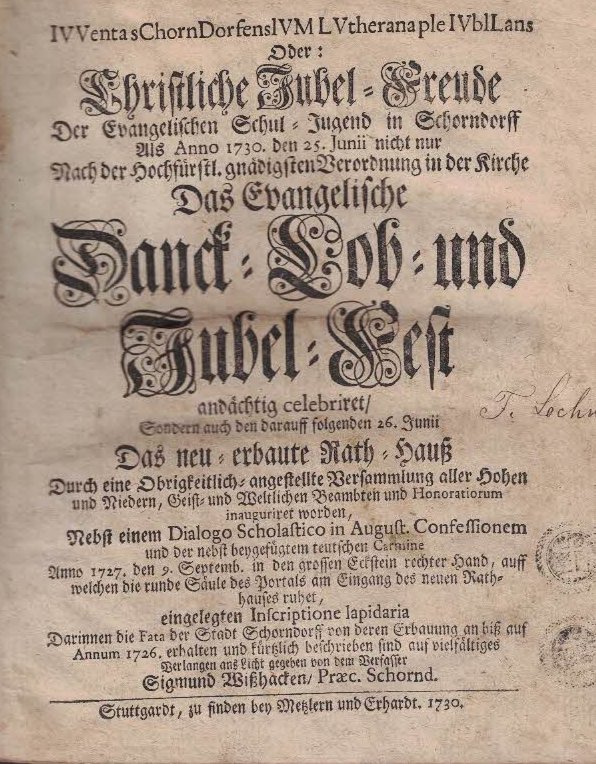
Bengel, Johann Albrecht. Erklärte Offenbarung Johannes oder vielmehr Jesu Christi. 2nd edition. Stuttgart: Joh. Christoph Erhardt, 1746. 1,176 pages. Title page is typed. Bengel, 1687-1752, was the foremost post-Reformation theologian in Württemberg. A man of eminent piety and vast and sound learning. In 1734 he published an edition of the Greek New Testament with a critical apparatus. His greatest work: Gnomon Novi Testamenti. Both of these works are in the LSTC Rare Books Collection.
Buddeus, Johann Franz, with annotations by Johann Georg Walch. Historische und Theologische Einleitung in die Vornehmsten Religions-Streitigkeiten. Jena, 1728. 743 pages.
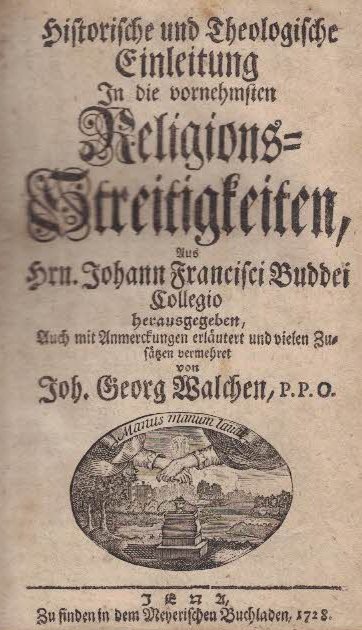
Buddeus, Johann Franz. Isagoge historico theologica ad theololgiam universam. Leipzig, 1727. Budde, 1667-1729, mediated between orthodox Lutheranism and Pietism. Case 7 shelf 3 between the rows.
Calov, Abraham. Biblia Illustrata. Dresden and Leipzig, 1717. With annotations by Hugo Grotius. Genesis to Lamentations of Jeremiah. 2nd edition, 1719. Prophets and Apocrypha, 1719; Matthew-Acts, 1719; Romans to Revelation, Dresden and Leipzig, 1719; Abraham Calov, 1612-1686, was active in almost every phase of the church’s work: administration, preaching, teaching, and writing. Biblia Illustrata, first published 1672-1676, is considered his greatest work.Proponent of Confessional Lutheran Orthodoxy. The second, third, and fourth volumes are located in case 7 row 4.
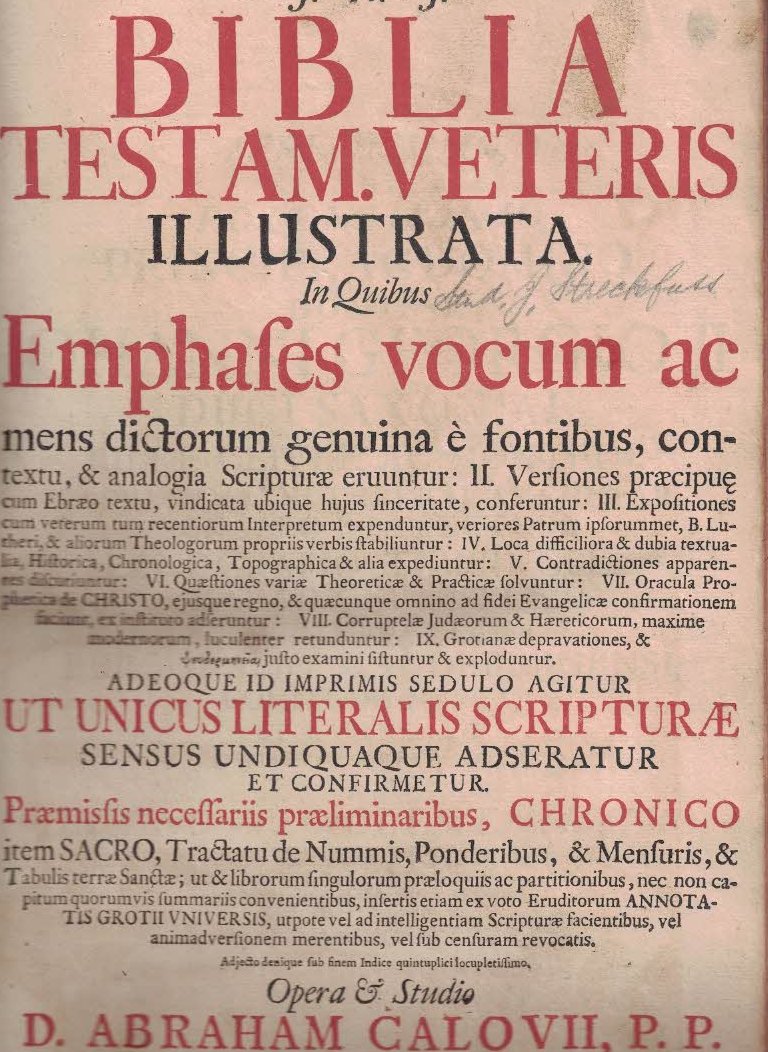
Fabricius, Johann Albert. Codex Apocryphus Novi Testamenti. Hamburg, 1703. 970 pages. Johann Albert Fabricius, 1668-1736.
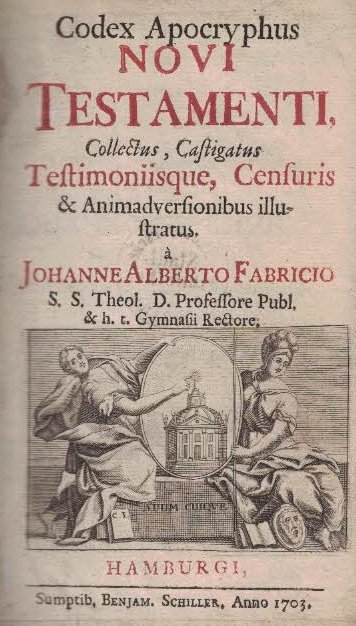
Fabricius, Johann Albert. Codicis Apocryphi Novi Testamenti. Pars terta Second edition. Hamburg, 1743. 1,035 pages.
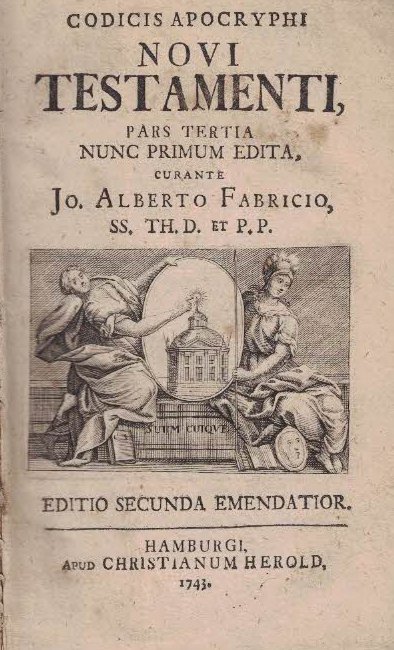
Fabricius, Johann. Historia Bibliothecae Fabricianae. Wolfenbüttel. Part I, 479 pages, 1717; Part II, 526 pages, 1718; Part III, 546 pages, 1719; Part IV, 546 pages, 1721; Part V 543 pages 1724; Part VI 576 pages, 1724. Johann Fabricius, 1644-1729, sought to minimize confessional differences.
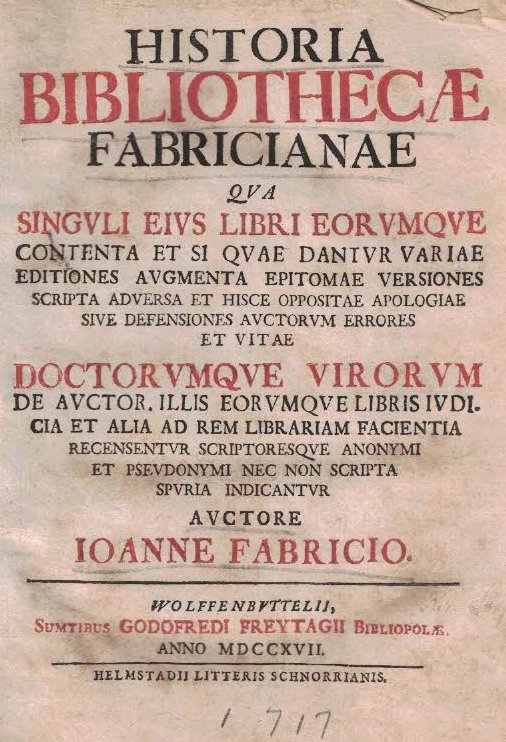
Grotius, Hugo. De Veritate Religionis Chistianae (Concerning the Truth of the Christian Religion). 1709. 352 pages. Hugo Grotius, 1583-1645, is known as the father of International Law. He originated governmental theory of the atonement. Joannes Clericus, 1657-1736, denied the Mosaic authorship of the Pentateuch
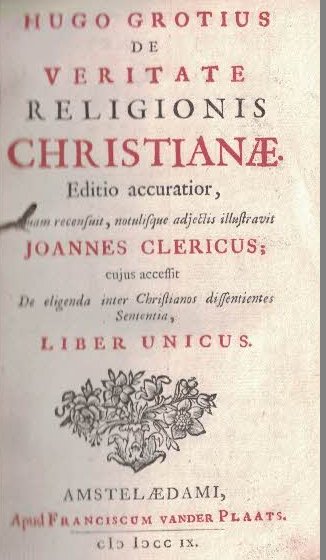
Hofmann, Carl Gottlob. Ausführliche Reformations Historie der Stadt and Universität Leipzig . 1739, 444 pages.
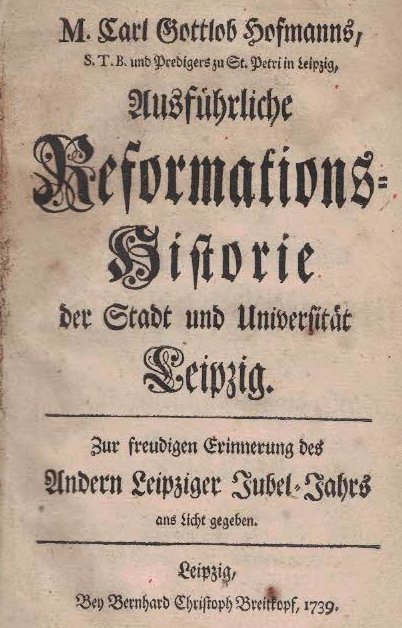
Hollaz, David. Examen theologicum acroamaticum. 1763. Hollaz, 1648-1713, was a Lutheran dogmatician.
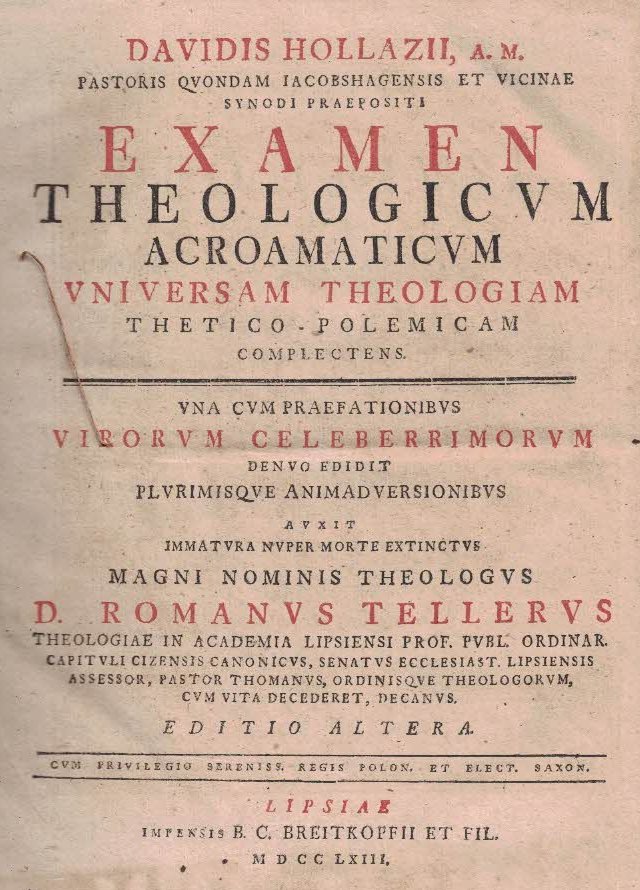
Jöcher, Christian Gottlieb. Compendioses Gelehrten Lexicon. Leipzig, 1758. The author lived from 1694-1758. Case 10
König, Johann Friederich. Theologia Positiva Acroamatica, Synoptice tractata. Rostock and Leipzig, 1711. 291 pages. König, 1619-1664, taught at Greifswald and Rostock. This work was the basis of many 17th century dogmatic lectures, including J. A. Wuenstedt’s Theologia didactio-polemica.
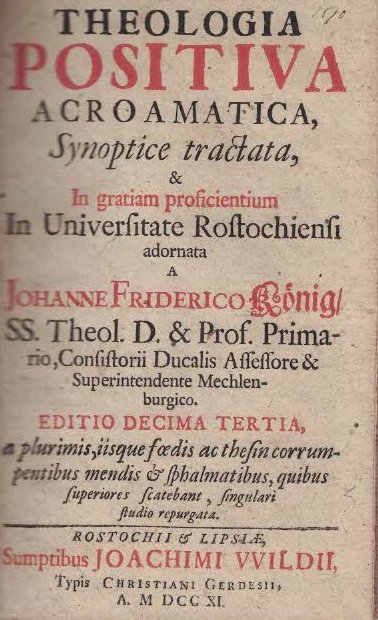
Lessing, Gotthold Ephraim. Anti-Goeze. Braunschweig, 1778. In 1777 Lessing, 1729-1781, had published rationalistic comments on the New Testament under the name of H. S. Reimarus. Pastor J. M. Goeze, 1717-1786, of Hamburg made bitter attacks on Lessing. This volume contains five of a series of eleven polemical pamphlets against Pastor Goeze. Case 10
Lilienthal, M. Meichael. Biblischer Archivarius der heiligen Schrift Neuen Testaments. Königsberg and Leipzig, 1745. Case 6 shelf 3.
Pfaff, Christoph Mattäus. Introducio in Historiam Theologiae Literariam. Vol I ,1724, 473 pages; Vol II, 1725, 472 pages; Vol III, 1726, 568 pages. Pfaff, 1686-1760.
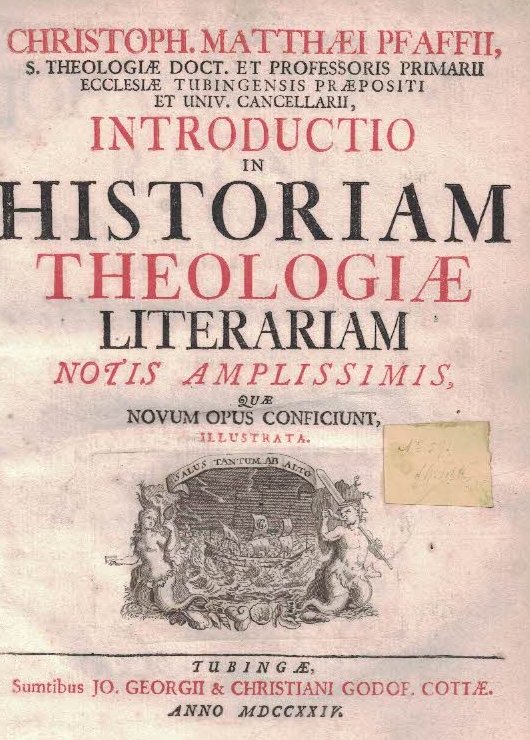
Pfeiffer, August. Thesaurus Hermeneuticus. 1704. 617 pages. Pfeiffer, 1640-1698, was a professor at Leipzig. A picture shows Phillip interpreting the fourth Servant Poem to the Ethiopian eunuch (Acts 8).
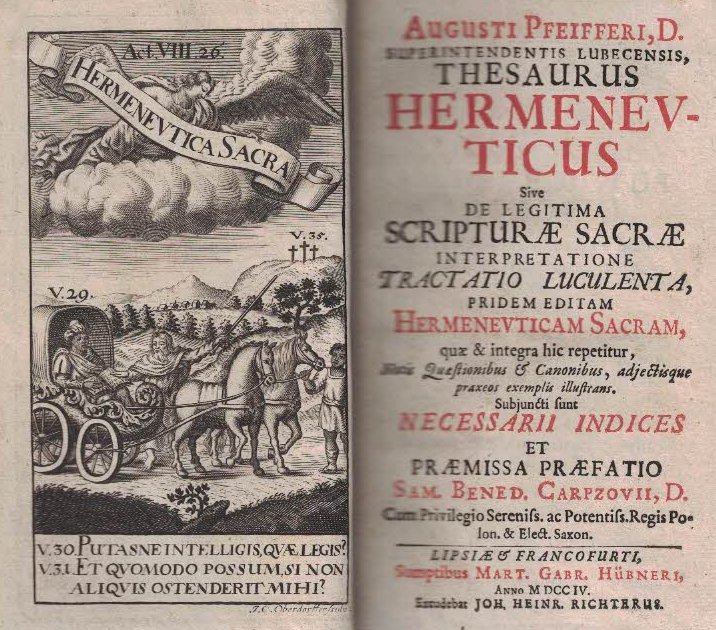
Pritius, Io Georgius. Introduction in Lectionem Novi Testamenti. Leipzig, 1737. 596 pages plus index. Also mentioned on title page Carl Gottlob Hofmann. Pritius, 1662-1732.
Pritius, Io Georgius. tou agiou patros makariou tou aigyptiou omiliai Sancti Patris Macarii Aegyptii Homiliae. Leipzig, 1714. Greek and Latin Homilies. Pritius, 1662-1732. Case 10
Rambach, Johann Jakob. Institutiones hermeneuticae sacrae cum praefatione Ioannis Francisci Buddei, 1732. 822 pages.
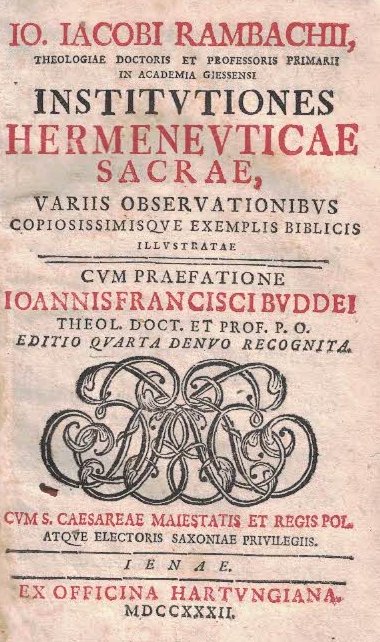
Relando, Hadriano. Antiquitates Sacrae Veterum Hebraeorum. 1708. 261 pages. Adriaan Reland, 1676-1718, made a significant contribution to research on the historical geography of early Palestine. Bound in same volume with Grotius, De Veritate.
Reusch, Johann Peter. Introductio in Theologiam Revelatum. Jena, 1760. 1,064 pages. Reusch, 1691-1758, was a professor at Jena.
Salig, Christian August. Vollständige Historie der Augspurgischen confession und derselben Apologie…bis auf den Anno 1555 geschlossenen Religions-Frieden. Halle, 1730. 856 pages. Salig, 1691-1738.
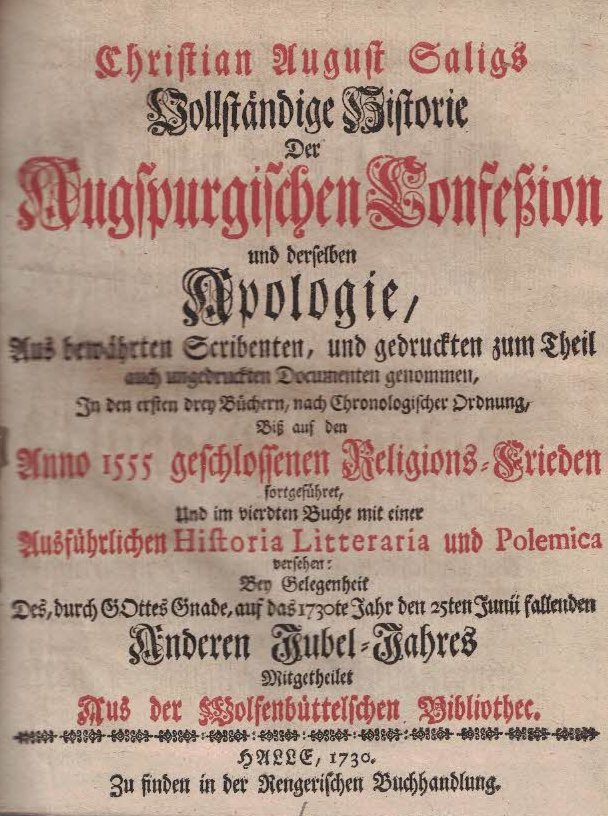
Tentzel, Wilhelm Ernst. Historischer Bericht vom Anfang und ersten Fortgang der Reformation Lutheri. Leipzig: Weidmann, 1718. 531 pages. Wilhelm Ernst Tentzel, 1659-1707.
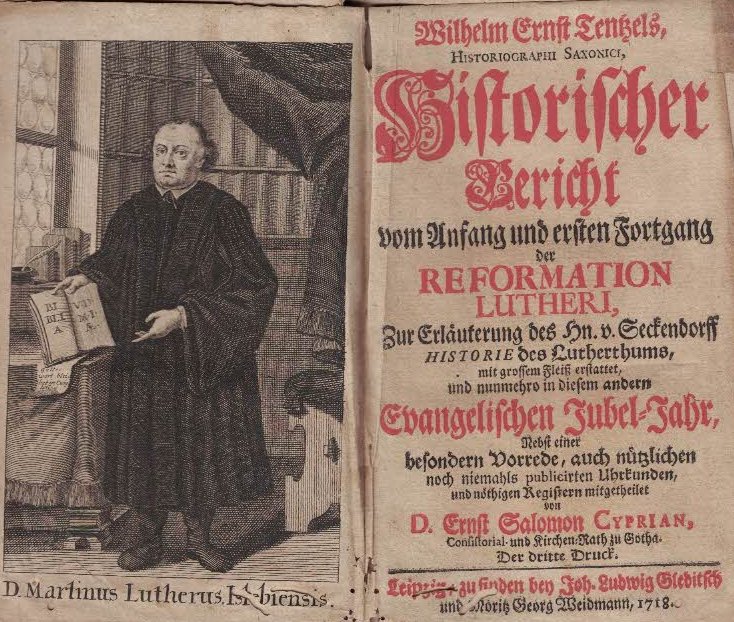
Walch, Christian Wilhelm Franz. Breviarum Theologiae Dogmaticae. Göttingen, 1775. 691 pages. Walch,1726-1784, son of Johann Georg Walch, adopted and modified his father’s moderate orthodoxy.
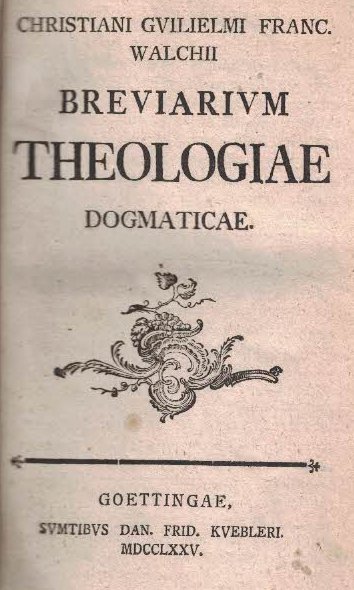
Walch, Johann Georg. Bibliotheca Patristica Literariis adnotationibus inststructa. Jena, 1770. 582 pages. Johann Georg Walch, 1693-1775.
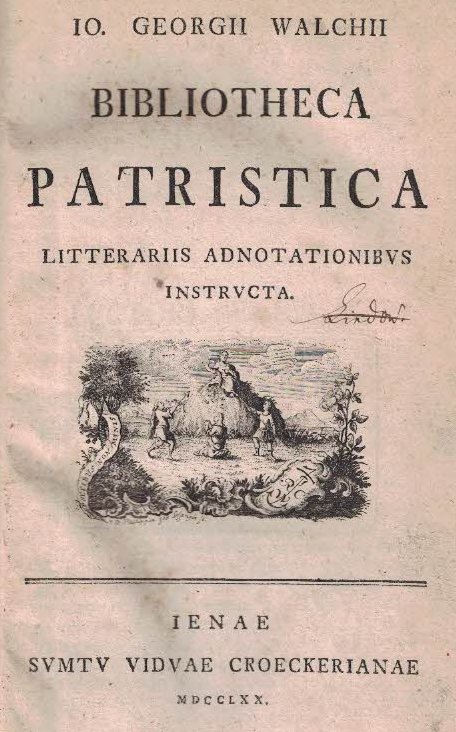
Walch, Johann Georg, ed. Bibliotheca Theologica Selecta. 4 volumes. Jena, 1777. Previously owned by Francis Pieper. Case 7 shelf 5,
Walch, Johann Georg. Einleitung in die theologische Wissenschaften. 2nd edition. Jena, 1753. 788 pages. Walch, 1693-1775.
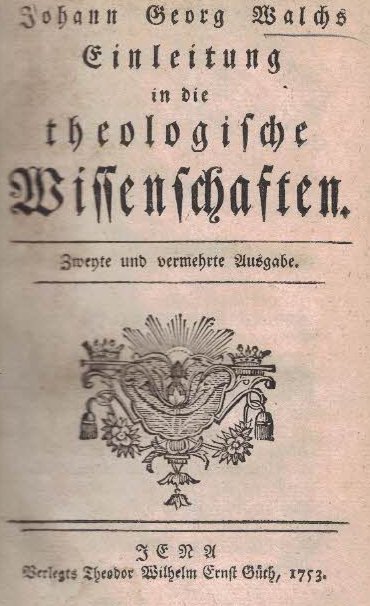
Walch, Johann Georg. Introductio in Libros ecclesiae Lutheranae Symbolicos. 1732. 1,007 pages.
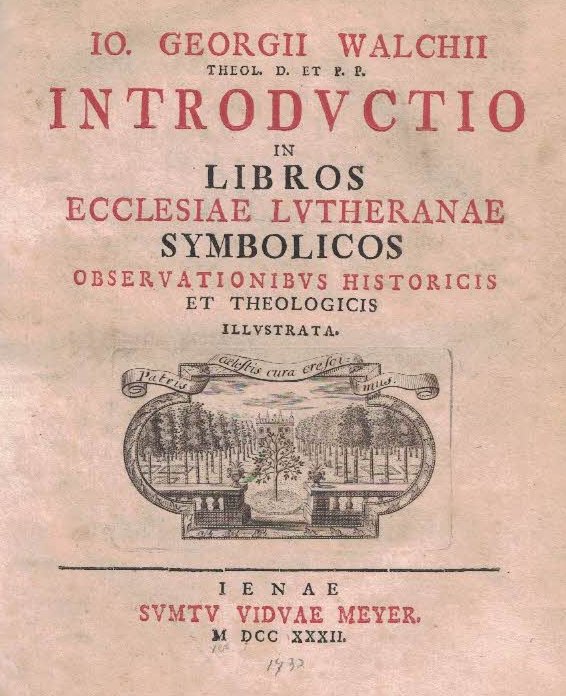
Walch, Johann Georg. Philosophisches Lexicon. Volumes 1 and 2. 4th edition. Leipizig, 1775. Previously owned by Paul M. Bretscher. Walch, 1693-1775, was father of Christian Wilhelm Franz Walch, 1726-1784, and Johann Ernst Immanuel Walch, 1725-1778. Case 7 shelf 5.
Much of the data on this page is taken from Deutsche Biographie (http://www.deutsche-biographie.de/index.html), Lutheran Cyclopedia, ed. Erwin L. Lueker, St. Louis: Concordia Publishing House, 1975, WorldCat, and from annotations by Edgar M. Krentz..
ä ü ö
